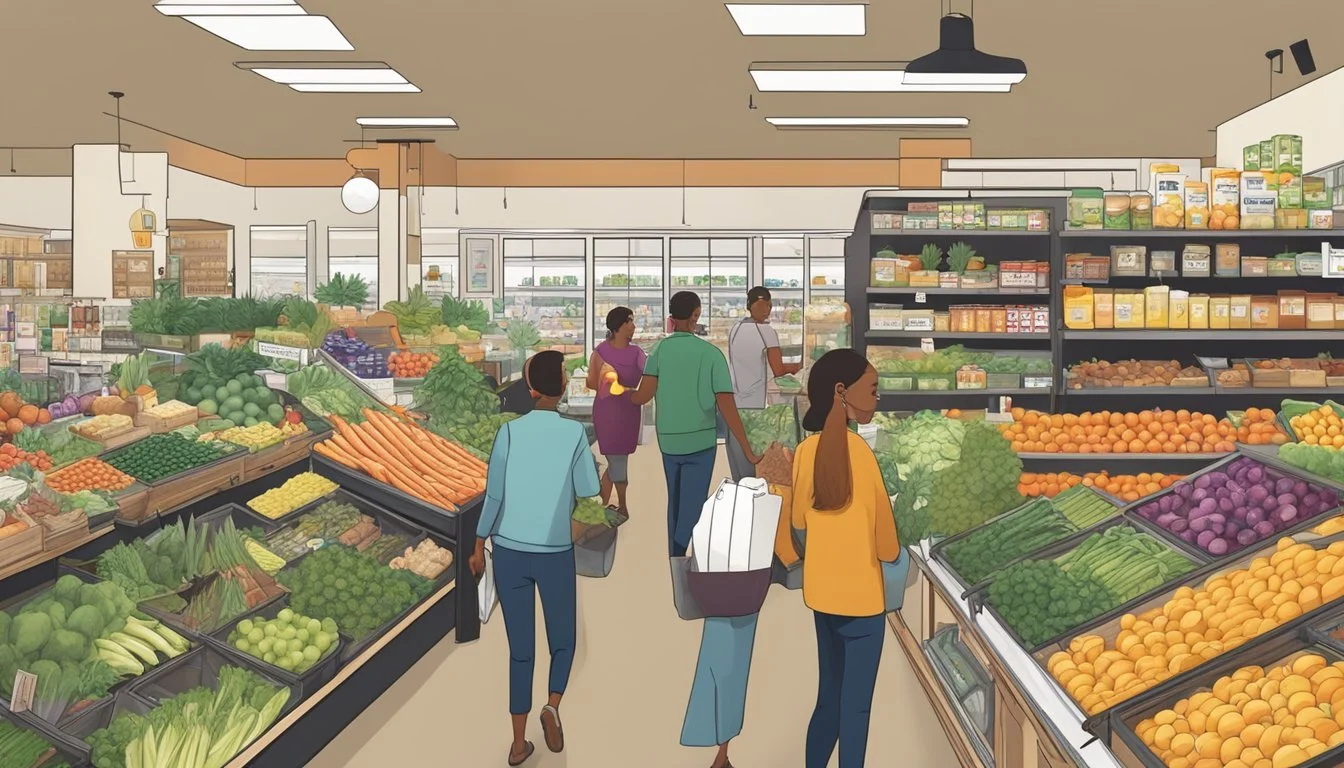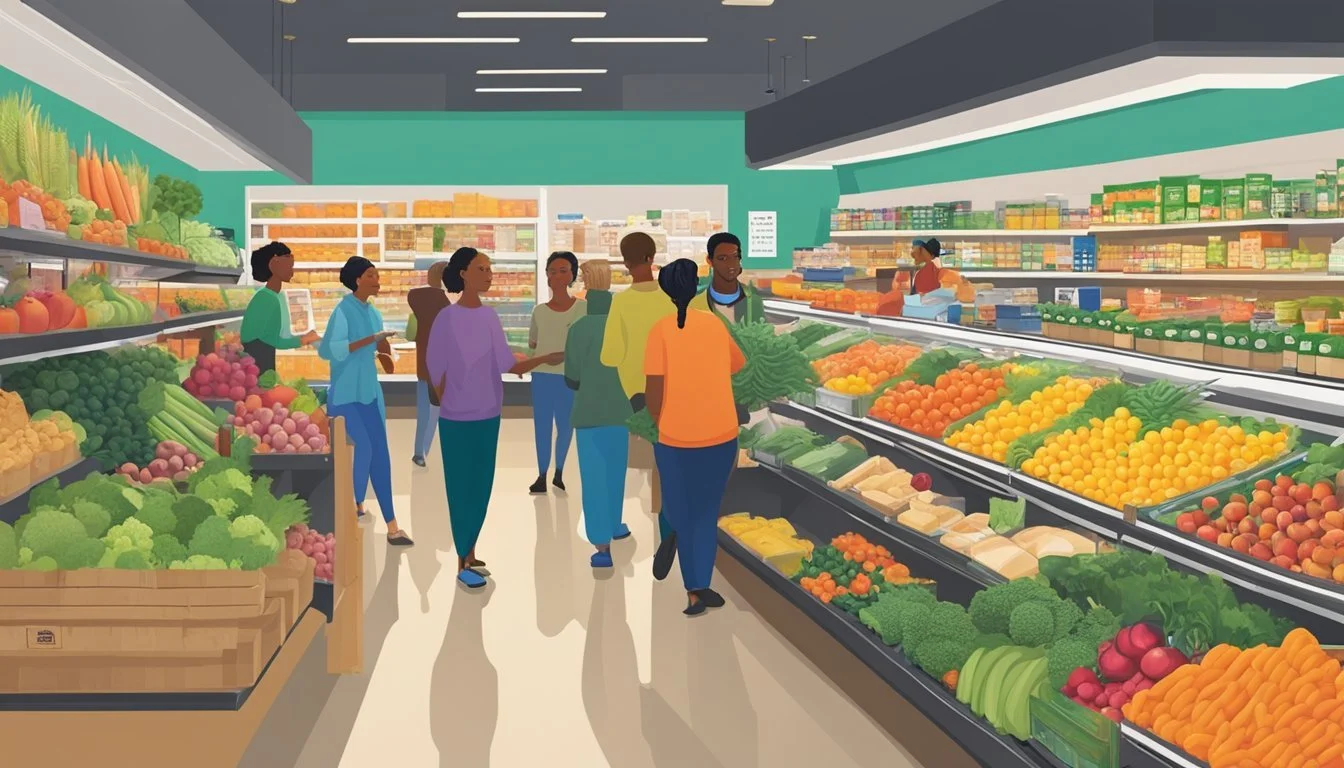Guide to Food Co-Ops in Raleigh, NC
Your Essential Access Guide
Raleigh, North Carolina, is a city that has embraced the cooperative movement, particularly in the realm of food co-ops. These co-ops are member-owned businesses where the decisions are made democratically, with each member having a say in operations. In Raleigh, food co-ops offer an alternative to conventional grocery stores by focusing on local produce, community involvement, and sustainable practices.
Food co-ops in Raleigh are known for their support of local farms and the local economy. They often provide fresh, locally-sourced food to their members and the broader community, contributing to a more sustainable food system. These cooperatives are not just commercial enterprises; they are a reflection of the community's commitment to health, nutrition, and support for local producers.
Shoppers in Raleigh's food co-ops can enjoy a variety of benefits, including access to high-quality, fresh foods, and the knowledge that they are helping to sustain a local food network. By participating in a cooperative, members take an active role in a movement that emphasizes ethical consumerism and community welfare, aligning their purchases with their values.
What Is a Food Co-Op?
A food co-op stands firmly on the pillars of community ownership and democratic member control, distinguishing itself from conventional grocery chains by its cooperative business model. They exemplify an alternative approach where the consumers have a definitive stake and say in the operations of the store.
Defining a Cooperative Model
A food cooperative, or food co-op, operates on the principle that it is owned and controlled by the members who shop there. This model provides a stark contrast to typical corporate grocery stores which are driven by profit maximization for shareholders. In a food co-op, members buy shares, effectively making them part-owners of the store. This involvement allows members to vote on important decisions, such as the types of products offered and sourcing practices.
Key Elements of a Food Co-Op Description Community Ownership Each member owns a part of the co-op, reinforcing the commitment to serving local needs over that of distant shareholders. Democratic Member Control One member equals one vote, grounding the co-op in democratic governance where everyone's voice carries equal weight.
History and Philosophy of Food Co-Ops
The history of food co-ops traces back to the cooperative movement that emerged in Europe during the 19th century, aimed at providing affordable food for working-class communities. The philosophy of food co-ops today still echoes the Rochdale Principles established by the early cooperative pioneers, which include voluntary and open membership, democratic member control, and concern for community.
Food co-ops often focus on sustainability, local sourcing, and fair trade, aligning with the members' values rather than solely financial gain. They embody the belief that a grocery store should do more than just sell food—it should also foster community well-being and support local ecosystems.
The Benefits of Joining a Food Co-Op
Joining a food co-op in Raleigh offers multiple benefits ranging from accessing fresh, healthy food options to supporting the local economy. Members have the opportunity to partake in a community-oriented grocery experience that prioritizes wellbeing and sustainability.
Fresh and Healthy Food Options
Food co-ops are renowned for their commitment to fresh and healthy produce. Members can enjoy a diverse array of fruits and vegetables that are often organic and sourced from local farms. The variety and quality of produce surpasses what one might typically find at a standard grocery store, ensuring that members have access to nutritious food options that support a healthy diet.
Supporting Local Farmers and Producers
A principle advantage of food co-ops is their support for local farmers and producers. By shopping at a co-op, members directly contribute to the local agricultural community, fostering a sustainable food system. This support helps maintain a market for locally grown food, reducing the carbon footprint associated with long-distance food transportation.
Economic Advantages for Members
Co-op members enjoy various economic benefits. Since the food co-op is managed and owned by its members, decisions are made to benefit the community rather than outside investors. Members often receive better pricing due to the co-op's ability to order in bulk and secure wholesale prices. In turn, these savings are passed directly to the membership, offering a more cost-effective alternative to conventional grocery shopping.
Notable Food Co-Ops in Raleigh and Surrounding Areas
Food cooperatives in the Raleigh area stand out for their commitment to local farmers, sustainable practices, and community engagement. They often provide a unique selection of organic and locally sourced products.
Weaver Street Market
Location: Raleigh, NC
Hours: Open daily, 8 am - 9 pm
Weaver Street Market has created a community-owned hub in Raleigh where consumers can find a range of natural and organic food items. With origins in Carrboro, this co-op has expanded to Raleigh, bringing with it a strong ethos of collaboration and quality.
Chatham Marketplace
Location: Chatham County, near Chapel Hill
Hours: Vary by location
A community-owned entity, Chatham Marketplace prides itself on offering organic and sustainable goods. Situated within a reasonable distance from Raleigh, this co-op is a testament to the strength of local supply chains and community demand for wholesome, mindful food options.
Durham Co-Op Market
Location: Durham, NC
Hours: Vary by location
Durham Co-Op Market is a cornerstone in the neighboring city of Durham, not far from Raleigh. It has gained recognition for its locally sourced products and community-driven initiatives, emphasizing affordability and accessibility, while creating a welcoming space for all.
Raleigh and its surrounding areas proudly host these co-ops, each contributing to a vibrant and responsible food culture.
How to Become a Member
Becoming a member of a food co-op in Raleigh provides individuals with a stake in their local food system and potential savings on purchases.
Membership Requirements and Fees
To join a food co-op in Raleigh, an individual typically needs to meet basic eligibility criteria and pay membership fees. Membership requirements often include being a resident of the local area or having an affinity with the co-op's goals. Specific co-ops may have additional requirements. Membership fees can vary but tend to be a one-time payment signifying a share in the cooperative. For instance, Fertile Ground Food Cooperative offers memberships that contribute to empowering the Southeast Raleigh community.
Co-op Membership Fee Fertile Ground Food Co-op One-time payment fee (exact amount can be confirmed with the co-op)
Member Benefits and Responsibilities
Members of Raleigh food co-ops, who are also considered member-owners, enjoy several benefits and are expected to fulfill certain responsibilities. Benefits may include:
Access to high-quality food at competitive prices.
A vote in important co-op decisions.
Potential discounts on purchases.
As a member-owner, responsibilities may comprise:
Participation in the co-op's governance, such as attending meetings.
Volunteering time or services, as some co-operatives operate partially on member labor, although this varies by co-op.
Members should reach out to their chosen co-op to understand the exact benefits and responsibilities associated with membership.
Exploring the Food Selection
Food co-ops in Raleigh offer a diverse array of food options, with a strong focus on fresh produce and a variety of specialty foods that cater to different dietary needs.
Produce and Organic Options
Raleigh's food co-ops boast an impressive selection of fresh produce, much of which is sourced from local farms. Shoppers can expect to find a vibrant assortment of fruits and vegetables that mirror the season's best offerings. Organic stores within these co-ops prioritize natural growing methods, ensuring that members have access to high-quality organic options free from synthetic pesticides and fertilizers.
Local Farms: Seasonal fruits and vegetables.
Organic Standards: Certified organic produce available.
Specialty Foods and Diet Considerations
For those with specific dietary preferences or restrictions, Raleigh food co-ops cater to a wide array of needs. Shoppers will find a thoughtfully curated cheese selection, featuring both local and international varieties. Additionally, the co-ops accommodate various diets, providing gluten-free, vegan, and other health-conscious choices.
Cheese Selection: Local artisan and imported options.
Diet-Focused Foods: Gluten-free, vegan, and other special diet foods readily available.
Additional Services and Community Engagement
Food co-ops in Raleigh, NC are more than just places to shop; they often serve as hubs for community engagement and education. Members and non-members alike can benefit from a variety of additional services, including events, educational workshops, and up-to-date communications through various channels.
Events and Workshops
Many food co-ops host events and workshops designed to bring the community together and promote healthy living. These may include cooking classes, nutrition seminars, and sustainable agriculture presentations, which can help individuals make informed choices about their food. Such events are often advertised on community boards within the store and through digital platforms like Facebook.
Cooking Classes: Learn new recipes featuring local, organic produce.
Nutrition Seminars: Gain insights on dietary choices and their impact on health.
Sustainable Agriculture: Discover practices for supporting local farmers and the environment.
Newsletter and Social Media Connections
Staying connected with a food co-op is easy with the help of newsletters and social media. Often, co-ops encourage their patrons to sign up for a newsletter, which provides regular updates on upcoming events, store news, and community initiatives. Additionally, many co-ops maintain active Facebook pages where they share information and engage with community members.
Newsletter: Regular updates on co-op happenings.
Facebook: A platform for real-time interaction and community support.
The co-ops' communication channels ensure that their customers are well-informed and involved in the community's ongoing dialogue about sustainable food practices and collective well-being.
Navigating to and Around Food Co-Ops
When visiting food co-ops in Raleigh, NC, understanding the parking and public transit options available can make the journey smoother. Accessibility within these community-oriented stores ensures all shoppers can enjoy their experience.
Parking and Public Transit Options
Weaver Street Market, a local co-op option, provides parking facilities at its locations in the broader Raleigh area. Shoppers typically find ample parking in Carrboro, Hillsborough, and Chapel Hill. It's advisable to check each store's specific parking situation as they can vary, particularly during peak hours.
Public transit is also a viable option for reaching these co-ops. Raleigh's bus system offers routes that stop near co-op locations. Utilizing a map application or the online Raleigh bus schedules can help plan trips effectively. Here's a basic outline for the most relevant bus routes:
Route 4: Connects to Carrboro and Chapel Hill areas.
Route 15: Serves Hillsborough.
For real-time updates and specific route planning, consult the GoRaleigh or Triangle Transit websites.
Accessibility and Facilities
Food co-ops in Raleigh pride themselves on being accessible to all customers. They typically feature:
Wheelchair-friendly entrances and aisles:
Wide passageways
Accessible checkout counters
Facilities:
Public restrooms
Seating areas
For customers with mobility challenges, it's recommended to contact the co-op ahead of the visit to inquire about any specific needs or to request assistance. Many co-ops also offer services like curbside pickup to further enhance accessibility.
Reader Reviews and Testimonials
Reader reviews and testimonials offer insightful perspectives on the quality of products and services, as well as the impact food co-ops have on the Raleigh community.
Customer Experiences
Harmony Farms: Customers appreciate the diverse range of health market products, although some note that the prices can be higher than larger grocery stores.
User Rating: 4.1/5 (42 reviews)
Weaver Street Market: Known for its organic selection and bakery, this co-op has received praise for quality with a 4.4 rating based on 31 reviews.
Community Impact Stories
Weaver Street Market: The community often describes this cooperative as trendy, with a positive ambiance that contributes to the local vibe.
Durham Co-op Market: This co-op has been highlighted for its role in enhancing community food access and supporting local farmers.
Planning for the Future
The Raleigh area sees an ongoing evolution in the food co-op scene, with current initiatives focusing on both the expansion of co-op models and the integration of sustainable practices into their business operations.
Expansion and Development
The projected growth of food cooperatives in Raleigh involves a strategic approach to serving the community and enhancing accessibility. Specific plans include developing new outlets in underserved areas like Southeast Raleigh. These efforts aim to meet the increasing demand for local and ethically sourced products. Cooperatives operate on providing member owners with a voice in their business plan, ensuring that the expansion aligns with the needs and desires of the community.
Sustainable Practices and Goals
Food cooperatives in Raleigh are committed to adopting and maintaining sustainable practices. They scrutinize their business models to ensure a positive environmental impact by:
Procuring products locally: This reduces carbon footprint associated with long-distance food transportation.
Encouraging sustainable farming: Cooperatives are pivotal in supporting agriculture that respects natural resources.
By implementing these strategies, cooperatives strive to be at the forefront of sustainable commerce and community wellness in Raleigh.









